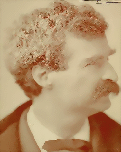

Folklore holds an important place in American literature of the 1880's and 1890's. In these decades a strong movement among folklorists to record the beliefs and lore of former slaves was accompanied by a literary counterpart. Writers like Joel Chandler Harris and Charles Chesnutt created a body of work which incoporated these beliefs and tales.
Although The Adventures of Huckleberry Finn is not a story based on a folk tale in the way that, for example, Harris' Uncle Remus stories are, folklore does play an important role in the narrative and in our understanding of Huck.
Huck's folk beliefs act in several ways. From his point of view, they are the catalyst for his adventures. Huck killing the spider and later spilling the salt cellar bring about the event - Pap's return - which leads to his running away and all that follows.
In addition to the role they play in the plot, folk beliefs in Huck Finn provide us with essential information about Huck and his relationship with Jim. For Huck, who does not have the support of a family or home and the traditional values these can provide, his folk beliefs become the solid foundation he lacks. They also are a connection with the only true family Huck has: Jim. Like the raft, these folk beliefs are a common ground shared by the boy and the slave and become both an equalizing and a binding force.
What follows is a brief examination of folk beliefs in The Adventures of Huckleberry Finn. Because they provide examples of similar beliefs, texts of stories by writers Joel Chandler Harris, Charles Chesnutt, and folklorist Mary Alicia Owen are also included in this site. For further reading on this subject, please see the list of sources.
 In Huck's Words In Huck's Words
|
 Religion and Huck Finn Religion and Huck Finn
|
 Superstition: Slaves: Boyhood Freedom; Twain on all three Superstition: Slaves: Boyhood Freedom; Twain on all three
|
 Folklore as Equalizer Folklore as Equalizer
|
 Some beliefs Some beliefs
|
 Hypertexts within this site Hypertexts within this site
|
 Sources Sources
|
|
|

Mark Twain and His Times |
|

American Studies @ UVA |